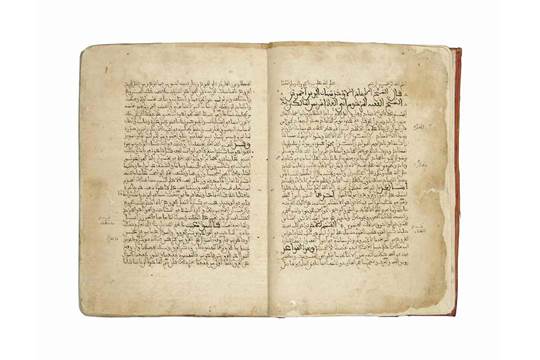Al-Qarāfī and other scholars (at-Tusūlī, Ibn Hamdūn, etc.) enumerated twenty root-principles the Mālikiyyah built their methodology upon.
Principles I-V: The Book
1) The explicit implication of the Book (Nass al-Kitāb)
What the Book explicitly indicates through an implication making room for no alternative.
Example:
His statement, Exalted is He: «Allāh has permitted sale» (Sūrah al-Baqarah: 275).
This Qur’ānic text is in fact explicit about the lawfulness of purchase and sale, and no divergent implication is countenanced by it.
The nass is an obvious example of a clear word.
2) The manifest implication of the Book (Zāhir al-Kitāb)
What the wording of the Qur’ān indicates through an implication of preponderant likelihood compared to a divergent one.
The zāhir is another instance of a clear word.
Example:
His statement, Exalted is He: «[A]nd forgo any remaining ribā» (Sūrah al-Baqarah: 278).
Allah commanded the mu’minūn to give up any ribā outstanding at the time of the revelation of the āyah.
Two possible implications from the wording of the āyah:
- Giving up what they had physically taken possession of, including what they had contractually agreed upon, although it was not yet in their hands;
- Giving up only what they had physically taken into their possession.
The implication (dalālah) of a Divine command is obligatoriness (= the command to do something obligatory), for that is the normal corollary of an imperative verb, so long as no circumstantial pointers take it out of its manifest implication, based on His statement, may He be Exalted: «Those who oppose His command should beware of a testing trial coming to them or a painful punishment striking them» (Sūrah an-Nūr: 63).
Accordingly, the manifest implication is the first one, i.e. they are commanded to forgo any ribā in their hands, physically in their possession or otherwise.
Dalālah al-mafhūm is an implied meaning not indicated in the text but arrived at by way of inference.
There are two recognized types:
3) The divergent meaning (Mafhūm al-mukhālafah or Dalīl al-khitāb, as it is interchangeably termed)
Affirming, for what is passed over in silence, the opposite ruling of what is explicitly verbalized, wherever the sole purpose behind mention of the explicitly verbalized ruling is negating its applicability to what is passed over in silence.
It is a meaning derived from the words in the text in such a way that it diverges from the explicit meaning thereof.
The Hanafis and even some Mālikī scholars, such as al-Bājī, essentially refute its permissibility.
Example:
Allah the Exalted says: «Divorced women should receive maintenance (mut`ah)» (Sūrah al-Baqarah: 241), «a duty for all those who have taqwā (al-muttaqīn)» (Sūrah al-Baqarah: 241).
He also says, concerning divorced women whose union has not been consummated: «But give them a maintenance (matti`ūhunna)… a duty for all good-doers (al-muhsinīn)» (Sūrah al-Baqarah: 236).
- The explicitly verbalized situation: A post-divorce maintenance is a duty on muhsinīn and muttaqīn;
- The only purpose for verbalizing that ruling is negating its applicability to lower human categories, negating, that is, the legal obligatoriness of that Divine instruction, which those who have taqwā and good-doers bind themselves by out of their higher conscience;
- The ruling on the situation passed over in silence, that of the generality of Muslims: the opposite of what is expressly verbalized, i.e. the post-divorce maintenance not being a legal obligation but only a meritorious gift.
Or we could say:
- The explicit meaning It is a meaning the words in the text: Post-divorce maintenance is a duty;
- The divergent meaning derived from the words in the text: Post-divorce maintenance is not a duty.
4) The harmonious meaning (Mafhūm al-muwāfaqah or al-Mafhūm bi’l-awlā, the meaning a fortiori, or lahn al-khitāb, the parallel meaning, or fahwā al-khitāb, the superior meaning, as it is interchangeably termed)
Affirming, for what is passed over in silence, the same ruling as the one applying to what is explicitly pronounced, on an equal footing at least.
It is an implicit meaning on which the text may be silent but is nevertheless in harmony with the pronounced meaning.
Example:
Allah the Exalted says: «People who consume the property of orphans wrongfully consume nothing in their bellies except Fire. They will roast in Searing Blaze» (Sūrah an-Nisā’: 10).
- The pronounced meaning: The Divine threat against those who devour the property of orphans indicates the prohibition of such a wrongful consumption thereof;
- The implicit meaning harmonious with it: The Divine threat against those who devour the property of orphans implies the prohibition of destroying such property altogether in a different manner, by for instance burning it. Consuming and burning (or the like) are in fact equal in bringing about the destruction of the orphan’s property, which is the effective cause (‘illah) of the prohibition. That is so even if burning his property goes to an event greater extent of wasting it away than its consumption, since that extra degree of destructiveness is not what the āyah purposively focuses on.
5) The notification of the efficient cause, or the alerting to the effective cause of a ruling, by the Divine address (Tanbīh al-khitāb)
Here, the Divine address informs us of the efficient cause of a ruling.
Example:
Allah the Exalted says: «[Say: ‘I do not find, in what has been revealed to me, any food it is harām to eat except for carrion, flowing blood and pork – for that is rijs (unclean, putrid and a cause of sinful rebellion against Allah» (Sūrah al-An`ām: 145).
- Carrion, flowing blood and pork are prohibited;
- The efficient cause (‘illah) of the prohibition of carrion, flowing blood and pork is their nature as rijs;
- The implication of His statement, may He be Exalted, in this āyah is to alert us to the prohibition of anything that is rijs.
Next:
The root-principles the Mālikiyyah have extracted from the Prophetic Sunnah.

FOUNDATIONAL ROOT-PRINCIPLES
OF THE MĀLIKIYYAH – 2
After looking at the five root-principles the Mālikiyyah derived from the Book, we are going to deal now with the five mirror principles drawn by them from the Prophetic Sunnah.
Principles VI-X: The Sunnah
6) The explicit implication of the Sunnah (Nass as-Sunnah)
What the Prophetic Sunnah explicitly indicates in such a manner as to leave no room for any alternative implication.
Example:
His statement, Sallallāhu ‘alayhi wa-Sallam, about the sale of a lactiferous animal (such as a milk cow), the milk of which is retained in the udder, thereby enlarging its size and creating the impression that an abundance of milk is its normal state: “Whoever buys it has the benefit of two options after milking it: if he is pleased with it he keeps it, and if he is displeased with it he returns it along with four double-handed scoops of dry dates” (Cf. Sahīh al-Bukhārī).
This hadīth, in fact, explicitly indicates the option conferred on a purchaser to return the animal plus a sā` (a measure) of dry dates as consideration for what he milked, or to keep it and sanction the sale with approval, in which case he owes nothing to the vendor. No alternative implication is permitted by this explicit text.
7) The manifest implication of the Sunnah (Zāhir as-Sunnah)
What the wording of the reported Sunnah indicates through an implication of preponderant likelihood compared to a divergent one.
Example:
The contract of salam or sale by advance is a species of sale where payment of the purchase price is immediate, i.e. advanced, for goods specified in the contract to be delivered at a specified later time.
In a hadīth transmitted on the authority of Ibn ‘Abbās, may Allah be pleased with him, the Prophet, Sallallāhu ‘alayhi wa-Sallam, is reported as saying: “Whoever advances the purchase price for dried dates (to be delivered later), let him advance payment about a known mass and a known weight and for a known date of future delivery” (Cf. Sahīh Muslim).
Here, the implication of the use of the imperative (fa’l-yuslif, let him advance payment) is the legal obligation of stipulating the deferred delivery of the salamgoods (deferred, that is, compared to the immediate payment of the price).
The manifest implication of the imperative is in fact obligatoriness, so long as no circumstantial pointers prove otherwise, based on His statement, may He be Exalted: «Those who oppose His command should beware of a testing trial coming to them or a painful punishment striking them» (Sūrah an-Nūr: 63).
Hence, the manifest implication of the hadīth, the obligation of stipulating deferred delivery of the salam goods, prevails over a divergent implication (the neutral permissibility or meritoriousness of such a stipulation).
It is not, however, an implication that leaves no room for a divergent one, as there might theoretically be evidence deflecting the imperative from the outward implication of a command to do the obligatory.
Another example:
The Prophet, Sallallāhu ‘alayhi wa-Sallam, after saying: “Pure earth is ritually pure, even if you cannot find water for up to twenty years”, added: “but if you find water, let it touch your skin” (Cf. Sunan Abī Dāwud).
Once again, the imperative verb is used (fa-amissahu jildak, let it touch your skin). The manifest implication thereof, no evidence having deflected it from its scope, is the obligation to revert to water once it is available.
8) The divergent meaning from the Sunnah (Mafhūm al-mukhālafah or Dalīl al-khitāb, as it is interchangeably termed)
A meaning derived from the words in the text in such a way that it diverges from the explicit meaning thereof; i.e. affirming, for what is passed over in silence, the opposite ruling of what is explicitly verbalized.
It is a proof according to Mālik and his followers (with some notable exceptions such as al-Bājī).
What is the ground for considering it a proof?
We have the statement from the Prophet, Sallallāhu ‘alayhi wa-Sallam, on the authority of Abū Sa`īd al-Khudrī: “Water is only from water” (Cf. Sahīh Muslim).
In its pronounced meaning, this earlier Prophetic statement is to the effect that when sperm is discharged after the two circumcised parts meet in the act of sexual intercourse the ritual bath (ghusl) is obligatory.
The implicit divergent meaning of the hadīth, as such understood by the Companions, is that if, despite penetration by the male, he does not emit sperm, the ritual bath is not obligatory, since “[w]ater is only from” or “on account of water”.
This is therefore an instance of deriving a judgment of the Law from mafhūm al-mukhālafah or dalīl al-khitāb.
The Companions concurred on the fact that this hadīth was either abrogated (mansūkh) or specified (mukhassas) by the subsequent Prophetic statement, transmitted on the authority of ‘Ā’ishah, may Allah be pleased with her: “When the circumcised part crosses the circumcised part the ritual bath (ghusl) becomes obligatory” (Cf. Sunan at-Tirmidhī). Had they not understood the earlier hadīth in the way we mentioned, there would have been in fact no point in unanimously stating that the later hadīth had abrogated or at least specified it.
There are different types of divergent meanings recognized and relied upon by the Mālikiyyah, of different degrees of probative force:
1. Mafhūm as–sifah (The descriptive meaning, i.e. the meaning implied from the descriptive attribute)
Example from the Sunnah:
The Prophet, Sallallāhu ‘alayhi wa-Sallam, said: “Deferring repayment of a debt by an affluent person is unjust” (Cf. Sahīh al-Bukhārī, on the authority of Abū Hurayrah).
This is the pronounced meaning, and it rests on the description of the debtor as a well-to-do person.
The divergent meaning implied from it is that a delay to repay a debt by a person in straitened circumstances (an opposite description) is acceptable and not an injustice: accordingly, a debtor in a dire financial state cannot be imprisoned because of such delay.
A further example:
On the authority of Ibn ‘Umar, it is narrated that the Prophet, Sallallāhu ‘alayhi wa-Sallam, said: “Whoever buys a palm-tree and it is pollinated, its fruits belong to the seller, unless the purchaser stipulates otherwise in the contract” (Cf. Sahīh al-Bukhārī).
This is the pronounced meaning, and it rests on the description of the palm-tree as having been pollinated.
The divergent meaning implied from it is that, prior to pollination, the fruits of any such tree are the property of the purchaser.
The descriptive meaning (mafhūm as–sifah), though a proof for the Mālikiyyah, is not strong enough to counter a contrary proof in the pronounced meaning.
Here is an example:
As a category subjected to the wealth-tax in Islam, cattle can be fed with fodder by the owner or left to graze freely.
The Prophet, Sallallāhu ‘alayhi wa-Sallam, has said: “Zakāt is levied on freely-grazing cattle.”
This is the pronounced meaning, and it rests on the description of the cattle as freely grazing.
The divergent meaning implied from it is that cattle fed with fodder by the owner is exempted from the wealth-tax.
That is, however, not so. The generality of the pronounced wording in the otherhadīth: “For every forty cattle, one cattle is owed as tax” (Cf. Sunan at-Tirmidhī) takes precedence, being of greater probative force than the said divergent meaning implied from the other narration.
The Mālikī ruling is thus to levy zakat on both categories of cattle, without any differentiation.
In Al-Ishārah ilā Ma`rifah al-Usūl wa al-Wajāzah, Imām al-Bājī, having mentioned that the divergent meaning implied from the said hadīth is the non-taxability of cattle that do not graze freely, and having laid out his denial of dalīl al-khitābbeing a proof, stated what follows:
· For those who see it as proof, it is to make a judgment conditional on a meaning applicable to some members of a genus, the implication being to negate that judgment in respect of other members of that genus bereft of that meaning;
· The truth is that making a judgment conditional on a descriptive attitude in some members of a genus simply entails the applicability of that judgment to the members thereof with such descriptive attitude; as for the judgment specific to all the other members of that genus without such descriptive attitude, it should be investigated independently and not implied by “harmonious divergence” from it.
Be it as it may, the established Mālikī position is contrary to his on this aspect.
2. Mafhūm al-‘adad (The numerical meaning, i.e. the meaning implied from the number)
Here, the ruling based on the implicit meaning rests on the specification of the number in the text.
Example from the Sunnah:
In the hadīth transmitted on the authority of Ibn ‘Umar, may Allah be pleased with him, it is stated that “the Prophet, Sallallāhu ‘alayhi wa-Sallam, cut off a hand for the theft of a shield the price of which was three silver coins” (Cf. Sahīh al-Bukhārī).
This is the pronounced meaning.
The divergent meaning implied from it is that no hand can be amputated for the theft of a property of a lesser monetary value than that.
A second example:
It is transmitted on the authority of Sahl b. Abī Hathmah that the Prophet, Sallallāhu ‘alayhi wa-Sallam, said about the oath of qasāmah to establish criminal liability for murder: “Are you prepared to take fifty oaths, so that you may be entitled to the blood-wit of your companion or your man who has murdered?” (Cf. Sahīh Muslim).
The divergent meaning implied from the explicit pronouncement is that less than fifty oaths cannot establish entitlement to blood-wit.
A third example:
Abū Hurayrah, may Allah be pleased with him, has narrated from the Prophet,Sallallāhu ‘alayhi wa-Sallam, that he said: “The container of any one of you which a dog has licked is ritually pure if he washes it seven times, the first time with sand” (Cf. Sahīh Muslim).
This is the pronounced meaning.
The divergent meaning implied from it is that washing the container less than seven times is incapable of rendering it ritually pure.
3. Mafhūm ash-shart (The conditional meaning, i.e. the implied from the condition)
Example from the Sunnah:
The Prophet, Sallallāhu ‘alayhi wa-Sallam, said on the authority of Ibn ‘Umar, may Allah be pleased with him: “If one buys food, he cannot resell it until he has received it into his possession” (Cf. Sahīh al-Bukhārī).
· Condition: If … then …;
· Implied divergent meaning: If a person receives food as a gift, not as a result of a sale, he can sell it before taking possession of it (by mass or weight).
4. Mafhūm al-ghāyah (The meaning implied from the end-point, time- or place-wise, of a thing)
Example from the Sunnah:
As we saw just now, the Prophet, Sallallāhu ‘alayhi wa-Sallam, said: “If one buys food, he cannot resell it until he has received it into his possession.”
The pronounced meaning: Once he has taken possession of it (by mass or weight), he can resell food he has purchased. Receiving the purchased food into one’s possession is the end-point beyond which permissibility sets in.
The divergent meaning implied from it: Before taking possession of it (before reaching that end-point), he is forbidden to resell food he has purchased.
Another example:
The Prophet, Sallallāhu ‘alayhi wa-Sallam, said on the authority of ‘Alī, may Allah be pleased with him: “The pen has been lifted from three: from the sleeping person until he wakes up, from a child until he becomes of age, and from an idiot until he comes to his senses” (Cf. Sunan at-Tirmidhī).
The pronounced meaning: There is no legal accountability (taklīf) until one of the three end-points (waking up, puberty, or mental sanity) is reached.
The divergent meaning implied from it:
Legal accountability (taklīf) only exists upon cessation of sleep, after puberty or in a state of mental sanity (after crossing the said end-points).
5. Mafhūm al-hasr (The restrictive meaning, i.e., the meaning implied from the restrictive specification)
It applies to statements prevalently using the tool of restrictive exclusivity “innamā”.
Example from the Sunnah:
In Sahīh al-Bukhārī it is reported, on the authority of Jābir b. ‘Abdillāh, may Allah be pleased with him, that the Prophet, Sallallāhu ‘alayhi wa-Sallam, “established the right of pre-emption (shuf`ah) only (innamā) in respect of any jointly owned property as yet undivided; once boundaries are traced and roads diverted, there is no longer any right of pre-emption.”
This is the pronounced meaning: The restriction of the right of pre-emption exclusively to undivided co-owned property.
The divergent meaning implied from it is that a neighbour, who, not being a co-owner in a person’s property but only an adjoining owner, falls outside the restricted scope, has no right of pre-emption.
A second example:
‘Ā’ishah, may Allah be pleased with her, narrated that the Prophet, Sallallāhu ‘alayhi wa-Sallam, said: “Buy her. Clientage is only (innamā) for the one who sets a slave free” (Cf. Sahīh al-Bukhārī).
This is the pronounced meaning: The restriction of the ties of clientage to the person setting a slave free.
The divergent meaning implied from it is that no clientage can accrue in favour of the buyer of a slave, not even if he stipulates it in his favour, as he falls outside the restricted scope.
A third example:
‘Umar, may Allah be pleased with him, has narrated from the Prophet, Sallallāhu ‘alayhi wa-Sallam, that he said: “Actions are only by their intentions (innamā’l-a`mālu bin-niyyāt)” (Cf. Sahīh al-Bukhārī).
Innamā restricts the compass of sound actions to those underpinned by intention.
The divergent meaning implied from it is that no action is sound if unaccompanied by intention, falling, that is, outside the restricted scope.
A fourth example:
The Prophet, Sallallāhu ‘alayhi wa-Sallam, said: “No hand of a thief is cut off unless the value of the stolen property is one-quarter of a gold coin or more” (Cf. SahīhMuslim).
This is the pronounced meaning: The restriction of the imposition of the prescribed penalty for theft to the theft of a property valued at one-quarter of a gold coin or more.
The divergent meaning implied from it is that no hadd can be inflicted for the theft of an asset below that value.
9) The harmonious meaning ((Mafhūm al-muwāfaqah)
Affirming, for what is passed over in silence but implied, the same ruling as the one applying to what is explicitly pronounced, on an equal footing (parallel meaning) or with even greater force (superior meaning).
Example:
The statement by the Prophet, Sallallāhu ‘alayhi wa-Sallam, on what establishes proof in civil suits between litigants: “Your two witnesses or his oath” (Cf. Sahīh al-Bukhārī).
This is the pronounced meaning.
The implicit meaning harmonious with it is that proof by more than two witnesses establishes your right on even stronger grounds.
It is thus an example of fahwā al-khitāb, the superior meaning, one of the two categories of harmonious meaning: what is implied and not pronounced is more entitled to the judgment (hukm), here sufficiency of proof in a civil case, than what is explicitly pronounced.
A second example:
The hadīth transmitted on the authority of Ibn ‘Umar, may Allah be pleased with him, in which he said: “The Prophet, Sallallāhu ‘alayhi wa-Sallam, cut off a hand for the theft of a shield the price of which was three silver coins” (Cf. Sahīh al-Bukhārī).
This is the pronounced meaning.
The implicit meaning harmonious with it (again a superior meaning) is that, a fortiori, the prescribed penalty should be levied on someone who steals property exceeding that value.
A third example:
The Prophet, Sallallāhu ‘alayhi wa-Sallam, said: “Whoever forgets a salāt ought to perform it upon remembering it. There is no expiation (kaffārah) for it other than making it up; and establish salāt to remember Me” [1] (Cf. Sahīh al-Bukhārī).
This is the pronounced meaning.
The implicit meaning harmonious with it (once more a superior and not just a parallel meaning) is that, a fortiori, a person who intentionally discarded a salāt is obliged to make it up.
10) The notification of the efficient cause, or the alerting to the efficient cause of a ruling, by the Sunnah (Tanbīh as-Sunnah)
Here, the text informs us of the efficient cause behind a ruling.
Example 1:
In a hadīth transmitted on the authority of Abū Bakrah, may Allah be pleased with him, the Prophet, Sallallāhu ‘alayhi wa-Sallam, is reported as saying: “A judge must not preside over a case between two litigants whilst he is angry” (Cf. Sunan Ibn Mājah).
The implication of this statement is to alert us to the fact that anger, and whatever is akin to it that distracts and clutters one’s mind, is the efficient cause (‘illah) of the prohibition, and so long as that cause subsists, it is impermissible for a judge to preside over a case.
Example 2:
In a hadīth transmitted on the authority of Sa`d b. Abī Waqqās, may Allah be pleased with him, the Prophet, Sallallāhu ‘alayhi wa-Sallam, is reported as saying about the barter of fresh dates for dry dates: “Do they shrink when they become dry?”. As they replied in the affirmative, he, Sallallāhu ‘alayhi wa-Sallam, said: “Then no permission is given?” (Cf. Musnad Ahmad and Sunan at-Tirmidhī, who commented: “hasan sahīh”).
The implication of this statement from the Sunnah is to inform us of the cause behind the prohibition of bartering fresh dates for dry dates, namely, the lack of equivalence in the exchange of a usurious foodstuff for its genus.
Example 3:
The Prophet, Sallallāhu ‘alayhi wa-Sallam, said: “I only forbade you for the sake of the downtrodden Bedouins who came from the desert” (Cf. Sahīh Muslim).
The implication of this Prophetic statement is to notify us of the fact that the efficient cause for the prohibition of hoarding the meat of the animals slaughtered for ‘Īd was the arrival that year in al-Madīnah of weak and impoverished desert Arabs.
Example 4:
In a hadīth transmitted on the authority of Abū Qatādah, may Allah be pleased with him, the Prophet, Sallallāhu ‘alayhi wa-Sallam, said about the female cat: “It is not impurity. It is in fact part of the male and female creatures moving around in your environs” (Cf. Sunan at-Tirmidhī).
The implication of this hadīth is to awake us to the fact that the efficient cause of the ritual purity of female cats and their leftover water is their abundant mixing with humans in their houses, so guarding against them, purity-wise, would be a burdensome inconvenience.
Next, Allah willing, are root-principles 11 to 16: Scholarly consensus (ijmā`), analogical reasoning (qiyās), the practice of the People of Madīnah, statement of a Companion, juristic preference (istihsān) and custom and usage.








